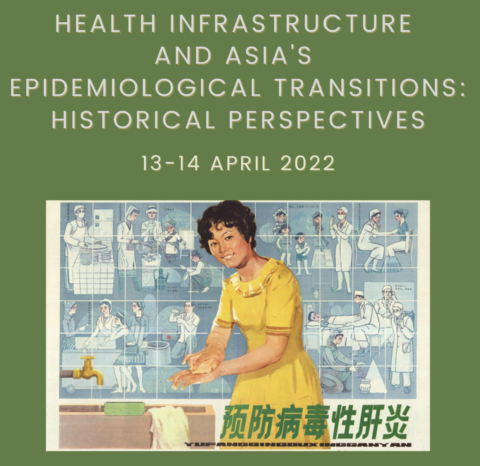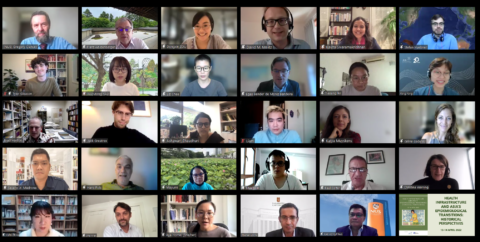
Download
Co-organizer
Asia Research Institute, National University of Singapore
Anmeldung
This is a past event. Registration is no longer possible.
Please subscribe to our DIJ Newsletter to stay informed about our research activities, events, and publications:
Health Infrastructure and Asia’s Epidemiological Transitions: Historical Perspectives
13. April - 14. April 2022

Post-event report (PDF) by Dongxin Zou and David M. Malitz
This workshop was jointly organised by the Asia Research Institute, National University of Singapore, and the German Institute for Japanese Studies, Tokyo.
The contemporary syndemic of infectious diseases, chronic health conditions, poverty, rising heat, and the lack of access to education and information has brought into focus the fragilities of existing health care systems primarily based on medical centers and reliant on a small core of professionals. This suggests a need to investigate the historical evolution of not only health care systems but also the infrastructures that underlay them; how they have succeeded or failed to cope with epidemiological and other transitions in the long twentieth century that brought us to the present moment.
“Infrastructure” in Science and Technology Studies draws attention to institutions, materials, spaces, routines, and conventions that come together to shape and enable systems. Sociologists of health have adopted the concept of “care infrastructure” to engage with the interactions between material and social elements of present-day home care and selfcare practices against the backdrop of the perceived transition from the age of pestilence to the age of chronic non-communicable diseases. “Health infrastructure” can also broadly encompass historical variations of the socio-technical relations behind all kinds and scales of routine and emergency health services, with an emphasis on integrating those relations within the larger forces of changing demographics, inequality, environmental conditions, political claim making, and state-society as well as international relations.
This workshop investigated Asian experiences, and in particular those of East and Southeast Asia, in crafting health infrastructure over the long twentieth century. Asia has long been stigmatized as a source of global contagion, yet relatively little research about the fallout of epidemics in the region is available for an English readership. There has also been relatively little historical examination of the everyday health challenges faced by communities in Asia. With many lower-and middle-income countries in the region having faced epidemiological transitions, especially also due to the increasing impact of climate change, and its extensive internal and international migration and trade networks, Asia provides important ground for the comparison of different health infrastructures, their developments, and their ability to cope with crises.
The workshop brought together scholars with different geographic foci within Asia to engage in a comparative and connective dialogue, and produce new ways of understanding the dynamics of health and disease under the processes of decolonization and development, but also with an eye to drawing lessons from the past that could lead to formulating better health policies in the present.
A publication of selected papers is planned.
KEYNOTE SPEAKER
Assoc Prof Kavita SIVARAMAKRISHNAN, Associate Professor in Sociomedical Sciences, Mailman School of Public Health, Columbia University
WORKSHOP CONVENORS
Dr Dongxin ZOU, Asia Research Institute, National University of Singapore
Dr David M. MALITZ, German Institute for Japanese Studies, Tokyo
Assoc Prof Gregory CLANCEY, Asia Research Institute, and Department of History, National University of Singapore